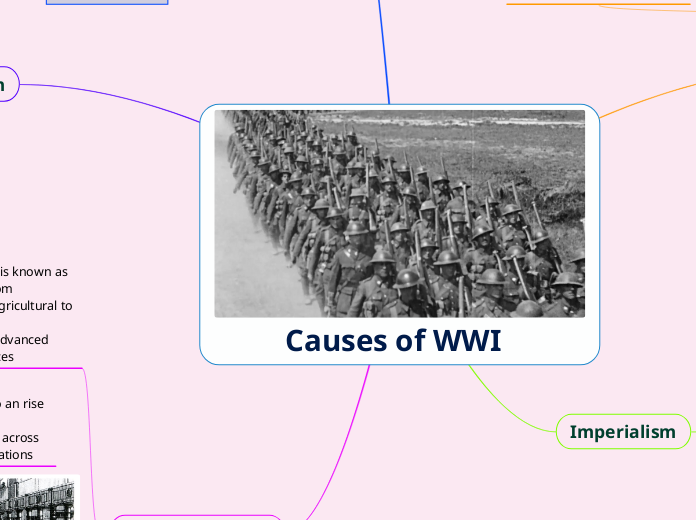Causes of WWI
Alliances
An alliance is a partnership between two or more people, groups, or nations that has been formed to further a shared goal.
There were 2 main groups of alliances in WWI
The Triple Entente
France
Great Britain
Russia
Italy (1915-)
U.S. (1917)
Central Powers
Germany
Austria - Hungary
Ottoman Empire
Bulgaria
Italy (until 1955)
How it led to WWI
When one country gets threatened, the countries they have alliances will come to help, this has a potential to escalate the conflicts
Imperialism
Imperialism is a political system or a desire for dominance and power over other nations that involves a wealthy, strong country.
This photo shows how the strong country, England, has its arms on all the other countries.
How it led to WWI
The expansion of empires by nations like Britain and France contributed to rising tensions among the European nations.
Militarism
In this photo you can see the large armies built
Militarism is the ambition of a nation to bolster its military forces in order to increase its power.
How it led to WWI
When large armies were built up, it created lots of tension throughout countries, notably Germany and Russia. This tension pushed the countries to be involved in war and test which countries have the best armies.
Nationalism
Nationalism is the ambition to unite all citizens of a country under one government
How it led to WWI
Nationalism led to the outbreak of World War One as a result of nations' desire to position themselves as the most powerful and developed society on the world.
Industrialization
Industrialization is known as the transition from predominantly agricultural to mass-produced, technologically advanced goods and services
This leads to an rise in economic competition across European Nations
How it led to WWI
The manufacturing method was changed by the Industrial Revolution, which made mass production of weapons simpler and faster. As a result, the major countries engaged in an arms race as they aimed to retain or boost their military might by bolstering their armies and fleets.
